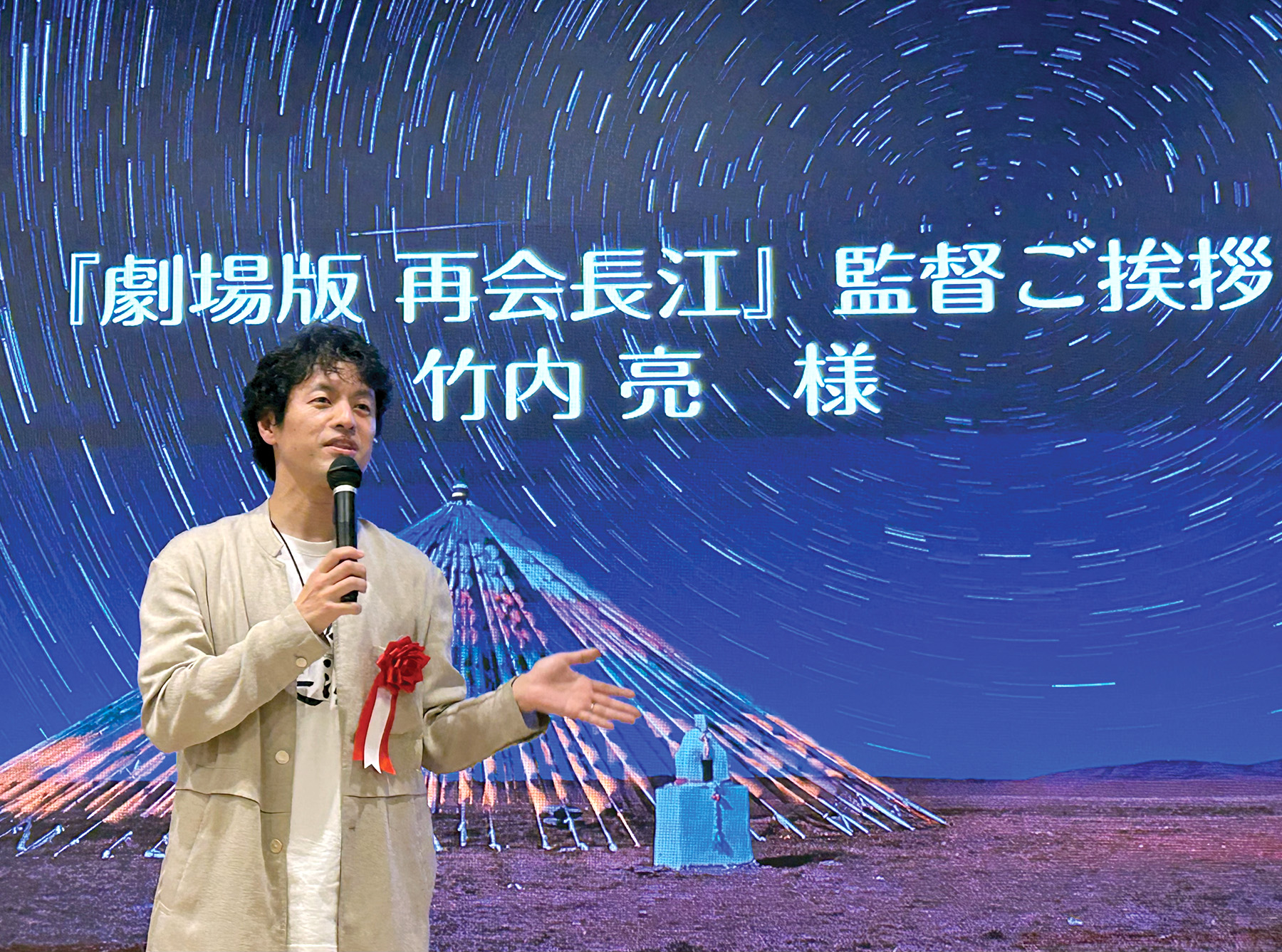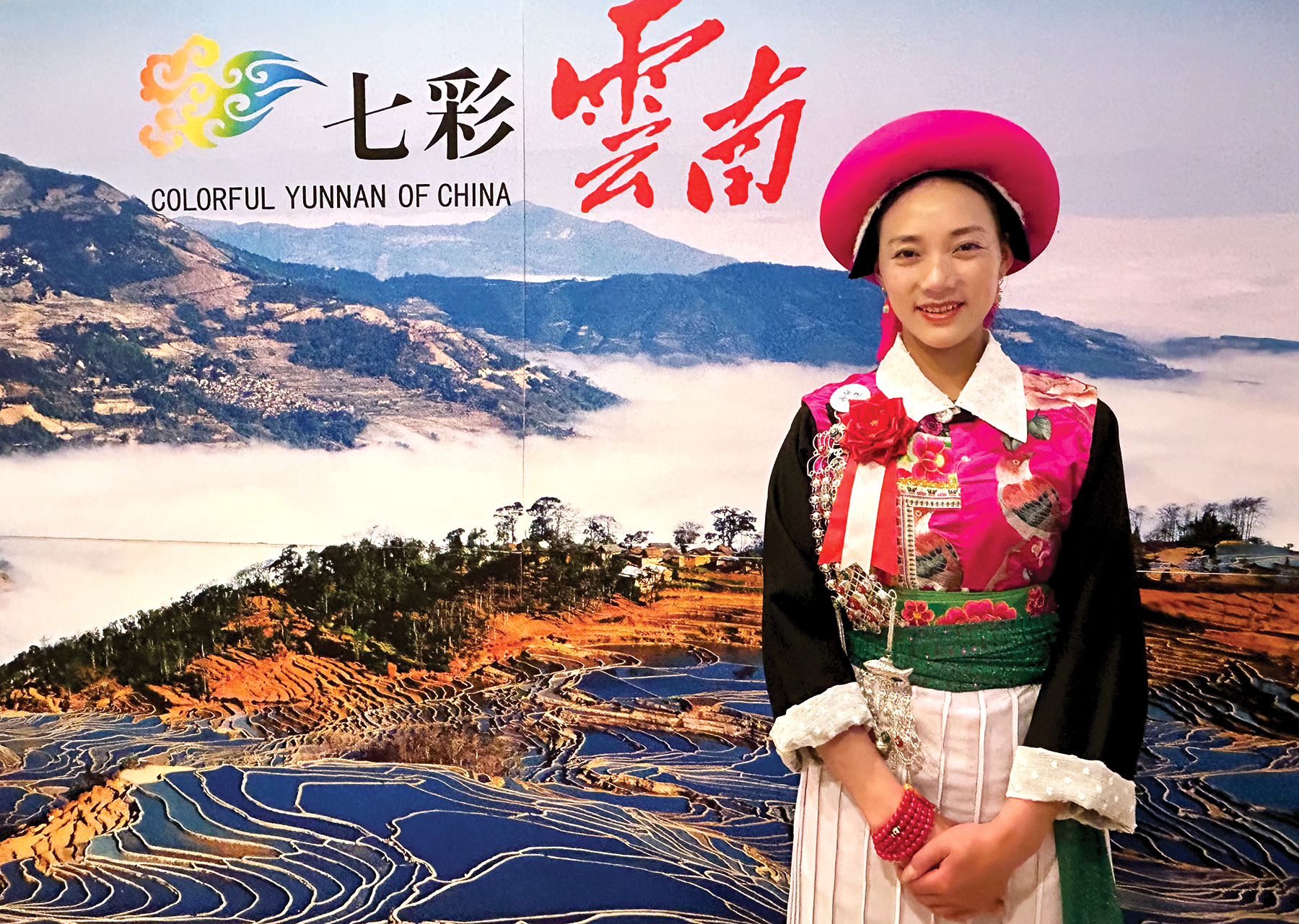Japanese director revisits Yangtze River documentary a decade on, records lives again for his countrymen

In 2010-11, Japanese documentary director Ryo Takeuchi filmed a documentary series about the Yangtze River for Japan’s public broadcaster NHK. A decade later, starting in 2021, he spent about two years retracing the 6,300-kilometer-long Yangtze River.
The documentary film The Yangtze River was released in Japan on April 12 and will begin screening in China in May.
“More than 10 years ago, I filmed the Yangtze River, but I was not satisfied with the work at that time. I couldn’t speak Chinese then, and living in Japan, I didn’t understand the real lives of the Chinese people, so what I filmed was very superficial. I always had an obsession with learning Chinese and understanding China before going to film the Yangtze River again,” Takeuchi said.
Born in Chiba Prefecture, the 45-year-old documentary director and his family moved from Japan to China in 2013 and settled in Nanjing, his wife’s hometown.
Living there, Takeuchi developed an affection for the Yangtze River. He enjoys Romance of the Three Kingdoms, a historical novel by 14th-century Chinese writer Luo Guanzhong. There are many places along the Yangtze River related to the Three Kingdoms, such as Chibi and Baidi City.
Along the Yangtze River, there are also cities familiar to Japanese people like Shanghai, Nanjing, Wuhan, and Chongqing, as well as various ethnic minorities.
“After watching this movie, many Japanese will definitely want to visit China. I hope I have provided them with an opportunity to visit China in person,” he said.
“Nowadays, many Japanese only rely on Japanese media reports and think this or that about China is bad. I hope my film will be their first step in understanding China. Don’t blindly criticize China without ever having been there or met Chinese people.”
During the filming of the new documentary, he revisited some of the people living along the Yangtze River that he had filmed more than 10 years ago, including Cimu, a Tibetan woman living in Shangri-La, Yunnan province.
In 2011, at the age of 18, Cimu, dressed in Tibetan attire, held a white lamb at the Napa Sea scenic area, inviting tourists to take photos with her lamb for 5 yuan ($0.69) each.
She had never left Shangri-La and was curious about big cities like Shanghai, airplanes, and skyscrapers mentioned by the documentary host, so Takeuchi’s film crew came up with the idea of taking her to Shanghai.
At the crew’s invitation, Cimu went to Shanghai with her parents in 2011, took the subway for the first time, saw the Huangpu River, and took the elevator up to a skyscraper for a distant view. It was also her first time seeing a bathroom in a hotel room.
This experience left a deep impression on her. Later, in a letter to the film crew, Cimu wrote, “I hope to have a big, beautiful house like others and then open a small inn at home.”
After returning to Shangri-La, Cimu found a job at a guesthouse and gained experience in the industry. Later, she and her family borrowed more than one million yuan from several banks, renovated their two-story Tibetan-style house, and opened a homestay called Aurora Hotel, which officially opened for business in November 2021.
When Takeuchi saw her again, she had become a capable innkeeper. She said the trip to Shanghai was inspiring and strengthened her determination to open a homestay. Now, she hopes her homestay will have a stronger sense of design, incorporating Tibetan cultural elements and having a different style from other guesthouses.
“I didn’t realize how important it was to take Cimu to Shanghai until I saw her again. It opened her eyes. When I was filming the documentary back then, I found her interesting, beautiful, and cheerful. No matter what changes she has undergone in the past 10 years, I believe I can still capture fascinating and interesting stories,” Takeuchi said.

In the past decade or so, China has undergone many changes, especially with the internet bringing significant changes to people’s lifestyles and values. This is reflected in Takeuchi’s latest film.
When filming the original series, Takeuchi wanted to take Cimu to Shanghai but her uncle disagreed, believing that Tibetan women should not leave home to go elsewhere.
However, when Takeuchi visited Cimu again, her uncle said his views had changed. Now, even if Takeuchi proposed to take Cimu to other countries, he would not object.
In April this year, Cimu accompanied Takeuchi to Japan to promote the film’s release and visited a uniquely designed hot spring guesthouse in Gunma Prefecture.
Compared to 2011, not only has Cimu’s life undergone significant changes, but Takeuchi, who did not understand Chinese and could only stand behind the camera, has become proficient in Chinese and can appear in front of the camera. This is mainly due to his decision to move to China.
He made the move for two main reasons: First, he wanted to learn Chinese. At that time, he was quite well-known in the Japanese documentary industry and specialized in filming Chinese stories but he could not speak Chinese, which he found inconvenient. Second, he was in his 30s at the time and wanted to challenge himself, try new places, and experience new things.
“When I moved to Nanjing, I was worried about my children because they are half Japanese and half Chinese, and I was afraid they would be bullied at school in Nanjing. But in reality, they have never been bullied. I have been living in Nanjing for 10 years, and Nanjing people have never shown any dislike for Japanese people to me.”
In 2014, he and his wife founded Nanjing Hezhimeng Culture Communication Co. At first, he planned to cooperate with Chinese TV stations, leveraging his strengths to introduce Japanese culture to Chinese people by telling stories about Chinese people living in Japan. However, at a time of poor Sino-Japanese relations, his proposal was rejected by Chinese TV stations. Therefore, he started publishing his work on online video platforms such as Youku, iQIYI, Tencent, and Bilibili in 2015.
Later, he found that Japanese people really did not understand China. The proportion of Japanese people who have been to China is small, and most people still rely on Japanese media for information about China.
“We Japanese living in China are particularly dissatisfied with Japanese media reports on China because we know what real China is like, and it is very different from the China depicted in those stories. There is too much negative information about China, so I want to introduce the real China to Japanese people,” he said.
In his view, China’s subjects are extremely rich and profound, and can never be exhausted. Whether it is landscape, food, culture, history, society, or economy, there are many aspects to cover.
“I have filmed documentaries in Asia, Africa, South America, Europe, and the Middle East, but I still find filming in China the most interesting. After all, China has thousands of years of history and deep cultural heritage. Moreover, the Chinese people are diverse and fascinating. The country makes me want to film more and more,” he said.
Many Japanese netizens and media asked him why he does not film the dark side of China, Takeuchi said, “I’m not interested, why should I? Besides, many people have already covered negative news about China. Why should I compete with them for subject matter?”
He said: “I have always persisted in doing what I want to do, without changing. When I lived in Nanjing, I didn’t film the dark side of China, and when I lived in Japan, I didn’t either. I have always been filming fun topics about China such as scenery, cuisine, and culture. Those are the things I enjoy.”
In addition to The Yangtze River, he has also filmed works like Beyond the Mountain, Nanjing’s Anti-epidemic Scene, Long Time No See, Wuhan, and The Post-Pandemic Era.
He has now begun to film the stories of Japanese war orphans left behind in China.
After Japan’s defeat in 1945, during the period when the Japanese army withdrew from China, some Japanese were abandoned in China and later adopted by Chinese people. Among these war orphans, some returned to Japan with the assistance of the Japanese government in the 1980s and 1990s. At that time, there was a significant economic gap between China and Japan, so they chose to return.
However, their lives in Japan were not easy because they returned to Japan after growing up in China and could not speak Japanese, making it difficult to integrate into Japanese society. Many of them relied on subsidies from the Japanese government.
Takeuchi wants to film the stories of the war orphans who have returned to Japan. They grew up in China and have always missed China since returning to Japan but they have been unable to return due to lack of money. Takeuchi expressed his desire to take them to visit China again, although he is uncertain if this idea can be realized.
“I have always wanted to film stories related to war. As a Japanese person living in Nanjing, I have always wanted to film this subject but it’s too sensitive. I don’t know what the final film will be like, but I still want to challenge myself,” he said.
“It’s amazing that Chinese people are willing to adopt the children of Japanese invaders and raise them,” he added.
Next year will mark the 80th anniversary of the end of World War II and Takeuchi said he expects this documentary to be broadcast in China and Japan then.


